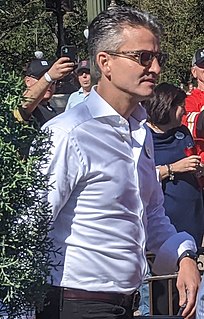
Brand alliances is a branding strategy used in a business alliance. Brand alliances are divided into three types.

Brand alliances is a branding strategy used in a business alliance. Brand alliances are divided into three types.
Cobrands are the usage of two or more brands on one certain product. For example, Dell computers carry three brands on their packages and cases: Dell, Microsoft Windows, and Intel. A visible example of cobranding is combining two or more of their restaurants under one roof. In many places, it is not unusual to see a Taco Bell and KFC or a Pizza Hut and WingStreet combined. [1]
Brand licenses are a contractual agreement where a company lets another organization use its brand on other products in exchange for a licensing fee. An example of brand licensing is seen in the Walt Disney Company's relationship to Tokyo Disneyland. The theme park is owned by The Oriental Land Company, which licenses the theme from The Walt Disney Company.
Cross marketing is an agreement for mutual promotion between two companies. One company for instance will include coupons for another company in its parcels to its clients if the other company will agree to include a promotion from the other company in its direct mails to its client base. [2]
{{cite journal}}: Cite journal requires |journal= (help){{cite journal}}: Cite journal requires |journal= (help)
Marketing is the process of exploring, creating, and delivering value to meet the needs of a target market in terms of goods and services; potentially including selection of a target audience; selection of certain attributes or themes to emphasize in advertising; operation of advertising campaigns; attendance at trade shows and public events; design of products and packaging attractive to buyers; defining the terms of sale, such as price, discounts, warranty, and return policy; product placement in media or with people believed to influence the buying habits of others; agreements with retailers, wholesale distributors, or resellers; and attempts to create awareness of, loyalty to, and positive feelings about a brand. Marketing is typically done by the seller, typically a retailer or manufacturer. Sometimes tasks are contracted to a dedicated marketing firm or advertising agency. More rarely, a trade association or government agency advertises on behalf of an entire industry or locality, often a specific type of food, food from a specific area, or a city or region as a tourism destination.
Guerrilla marketing is an advertisement strategy in which a company uses surprise and/or unconventional interactions in order to promote a product or service. It is a type of publicity. The term was popularized by Jay Conrad Levinson's 1984 book Guerrilla Marketing.
Competitive analysis in marketing and strategic management is an assessment of the strengths and weaknesses of current and potential competitors. This analysis provides both an offensive and defensive strategic context to identify opportunities and threats. Profiling combines all of the relevant sources of competitor analysis into one framework in the support of efficient and effective strategy formulation, implementation, monitoring and adjustment.
Marketing Communications refers to the use of different marketing channels and tools in combination. Marketing communication channels focus on how businesses communicate a message to its desired market, or the market in general. Marketing communication tools include advertising, personal selling, direct marketing, sponsorship, communication, public relations, social media, customer journey and promotion.

The Disney Store is an international chain of specialty stores selling only Disney related items, many of them exclusive, under its own name and Disney Outlet. Disney Store was a business unit of Disney Consumer Products with the Disney Parks, Experiences and Products segment of The Walt Disney Company conglomerate.
A strategic alliance is an agreement between two or more parties to pursue a set of agreed upon objectives needed while remaining independent organizations.

A strategic partnership is a relationship between two commercial enterprises, usually formalized by one or more business contracts. A strategic partnership will usually fall short of a legal partnership entity, agency, or corporate affiliate relationship. Strategic partnerships can take on various forms from shake hand agreements, contractual cooperation's all the way to equity alliances, either the formation of a joint venture or cross-holdings in each other.
A target audience is the intended audience or readership of a publication, advertisement, or other message catered specifically to said intended audience. In marketing and advertising, it is a particular group of consumers within the predetermined target market, identified as the targets or recipients for a particular advertisement or message. Businesses that have a wide target market will focus on a specific target audience for certain messages to send, such as The Body Shops Mother's Day advertisements, which were aimed at the children and spouses of women, rather than the whole market which would have included the women themselves.
Co-promotion is a marketing practice that allows two or more companies to combine their sales force in order to promote a product under the same brand name and price with a single marketing strategy. It is considered as one of the two major forms of joint marketing. Co-marketing is the other form and these terms are often confused. It is made through an agreement which requires a lot of collaboration between the sales and marketing organisations of both companies. One of the partners usually has a licence to exploit the product and the other partner is the originator or licensor. It helps the less developed areas of a company to be covered by the partner company's strengths and therefore to expand the share of voice in the marketplace for a product. Through co-promotion, a collaborative strategy, the consumer attraction is increased. It is a way co-exploiting products.
Licensing means renting or leasing of an intangible asset. It is a process of creating and managing contracts between the owner of a brand and a company or individual who wants to use the brand in association with a product, for an agreed period of time, within an agreed territory. Licensing is used by brand owners to extend a trademark or character onto products of a completely different nature.
Co-branding is a marketing strategy that involves strategic alliance of multiple brand names jointly used on a single product or service.
Diversification is a corporate strategy to enter into a new products or product lines, new services or new markets, involving substantially different skills, technology and knowledge.
Disney Consumer Products, Inc. is the retailing and licensing subsidiary of the Disney Parks, Experiences and Products segment of The Walt Disney Company. Previously, Consumer Products was a segment of Disney until 2016, then a unit of Disney Consumer Products and Interactive Media (2016–2018).
A marketing co-operation or marketing cooperation is a partnership of at least two companies on the value chain level of marketing with the objective to tap the full potential of a market by bundling specific competences or resources. Other terms for marketing co-operation are marketing alliance, marketing partnership, co-marketing, and cross-marketing. Sometimes, called as Consortium as well.

A brand is a name, term, design, symbol or any other feature that identifies one seller's good or service as distinct from those of other sellers. Brands are used in business, marketing, and advertising for recognition and, importantly, to create and store value as brand equity for the object identified, to the benefit of the brand's customers, its owners and shareholders. Name brands are sometimes distinguished from generic or store brands.
Alliance marketing is joining two or more organizations on the purpose of sharing marketing strategy, promoting concepts, services or products. Basically, alliance marketing can imply to any business as long as it finds an organization that has a mutual goal.

The Walt Disney Company India Private Limited, known simply as Disney India, is an Indian subsidiary of the Indo Pacific region of the American media and entertainment conglomerate The Walt Disney Company and headquartered in Mumbai, Maharashtra.
Foreign market entry modes are the ways in which a company can expand its services into a non-domestic market.
Sports marketing is a subdivision of marketing which focuses both on the promotion of sports events and teams as well as the promotion of other products and services through sporting events and sports teams. It is a service in which the element promoted can be a physical product or a brand name. The goal is to provide the client with strategies to promote sports or to promote some other product, service, business or cause through sports. Sports marketing is also designed to meet the needs and wants of the consumers through exchange processes. These strategies follow the traditional four "P"'s of general marketing: Product, Price, Promotion and Place. Another four "P"’s are added to sports marketing, relating to the fact sports are considered to be a service. The additional 4 P’s are: Planning, Packaging, Positioning and Perception. The addition of the four extra elements is called the "sports marketing mix."

Josh D'Amaro is an American businessman, who is Chairman of Disney Parks, Experiences and Products. Before becoming Chairman, D'Amaro has had a 22-year career with The Walt Disney Company, particularly in his positions across the resorts sector of the company.